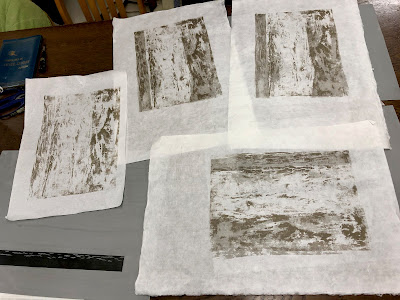目次 / Contents
1) 別願寺 / Betsugan-ji Temple
A. 新築 / Construct
B. 時宗 / Ji-shu sect
C. 一夜稲荷 / One Night Inari Shrine
2) リトグラフ工房 / Lithograph Studio
1) 別願寺 / Betsugan-ji Temple
A. 新築 / Construct
私は大町 (鎌倉市) のリトグラフ工房へ行き、作品制作をしています。
自宅に篭りがちな私にとっては、気分転換にもなります。
工房の往復の道では、目に止まった場面や景色を撮影します。
'撮影する'という意識をもって歩くと、ただ歩くよりも、面白い
もの、美しいものを発見できます。
別願寺 (ベツガンジ) を見つけたのも、そうした日々の中ででした。
このお寺は最初、一般住宅のような建物で、お寺には見えませんでした。
ですが、今年の初めころから工事が始まって、お寺に見える建物にかわりました。
 |
| 完成! 鎌倉市大町1丁目11- 4 6月14日撮影 Complete! 1-11-4 Omachi, Kamakura City Photograph on June 14 |
Construct
I go to the lithograph studio in Ōmachi, Kamakura, Kanagawa Prefecture and make my works.
For me, who tends to stay at home, it is also a change of pace.
On the round-trip road to the lithograph studio, I photograph the scenery and scenes that catch my eye.
If I walk with the awareness of 'photography', I would find more interesting and beautiful things than just walking.
B. 時宗 / Ji-shu sect
別願寺は、時宗 (ジシュウ) の寺です。
別願寺の創建は、 1282年です。
下記、鎌倉公方 について、Wikiより
~~
当時は鎌倉御所ないし鎌倉殿 (カマクラドノ) と呼ばれていた。"
今年の大河ドラマは、"鎌倉殿の13人"です。
それが影響して新築されたのかもしれませんね?
ですが、このお寺は、'鎌倉殿の菩提寺' となっていたのは、ドラマの時代から100年後です。
Ji-shu sect
Betsugan-ji Temple is a temple of Ji-shu sect.
Ji-shu is one of the Kamakura Buddhisms (Jōdo-shū, Jōdo Shinshū,
Ji-shu, Nichiren Shū, Rinzai school, Sōtō school )
opened by Ippen Shonin (1239 or 1234 - 1289).
Betsugan-ji Temple was founded in 1282.
Originally Nojo-ji Temple of Shingon Buddhism was renamed as Betsugan-ji Temple by a disciple of Ippen Shonin, Kounin Shonin (later Kakua), as a temple of Ji-shu.
[A different person from Kakua (1143 - ?),
In the early Muromachi Period (1336 - 1573) , it was the family temple of Kantō kubō :
Kamakura - dono.
According to Wiki About Kantō kubō,
"Kantō kubō (関東公方) (also called Kantō gosho (関東御所), Kamakura kubō (鎌倉公方), or Kamakura gosho (鎌倉御所)) was a title equivalent to shōgun assumed by Ashikaga Motouji after his nomination to Kantō kanrei, or deputy shōgun for the Kamakura-fu, in 1349."
According to Japanese Wiki About Kamakura kubō / 鎌倉公方, (translated by me)
"At that time, it was called Kamakura Imperial Palace or Kamakura- dono. "
This year's taiga drama : the 61st NHK taiga drama is
" 鎌倉殿の13人 / Kamakura-dono no Jūsan-nin ".
The Temple may have been rebuilt recently because of the TV drama.
However, this temple became 'Kamakura-dono's family temple' 100 years after the era of the Drama.
 |
| 倶像一雫 1282年以来、さまざまな碑が建てられ、その意味も不明で あるものの、廃棄もできず、ここに集められたのだと 推測します。 Collected Monuments Since 1282, various monuments have been erected, and their meanings are unknown, but it is speculated that they were collected here because they could not be discarded. |
C. 一夜稲荷 / One Night Inari Shrine
 |
稲荷山別願寺 別願寺敷地入り口には、'一夜稲荷' があります。 正式名は、稲荷山別願寺。 今日は、雨のせいか、扉が閉まっていました。 以前撮影した時は、晴れていて、 扉があいていました(下の写真)。 Inariyama Bestuganji Shrine There is a 'One Night Inari shrine' : 'Ichiya Inari' at the entrance of the Betsugan-ji Temple. The official name is Inariyama Besganji Shrine. The doors were closed today because of the rain? When I took a picture before, it was sunny and the doors were open, below. |
 |
稲荷ですが、赤い鳥居はありません。 (3月撮影) Inari shrines usually have a red torii gate or gates, but none are here. (Photograph in March) |
According to Wiki about Inari Shrine,
"An Inari shrine is a type of Japanese shrine
used to worship the kami Inari.
Inari is a popular deity associated with foxes, rice, household wellbeing, business prosperity, and general prosperity.
Inari shrines are typically constructed of white stucco walls with red-lacquered woodwork, and their entrances
are marked by vermilion torii."
"An Inari shrine is a type of Japanese shrine
used to worship the kami Inari.
Inari is a popular deity associated with foxes, rice, household wellbeing, business prosperity, and general prosperity.
Inari shrines are typically constructed of white stucco walls with red-lacquered woodwork, and their entrances
are marked by vermilion torii."
 |
たくさんの狐 / Many Foxes (3月撮影 / Photograph in March) |
 |
| 一夜稲荷の謂れの説明板 今回、この説明板に気がつきました。 以前は、私が見落としていたのか、 新しく設置されたのかわかりません。 Explanation Board for Origin of Ichiya Inari This time, I noticed this explanation board. I don't know if it was something I overlooked previously or was newly installed. |
下記、要約
"昔、この土地で疫病により多くの人が亡くなりました。
この稲荷:佐竹稲荷を信仰している者の夢枕に、佐竹稲荷の化身である翁が立ち、祠前に菜種をまき、育った菜を病人に服用させるように伝えられます。
信者がそのようにすると一夜で15cm (五寸) ほどに育ち、病人に服用させるとすぐさま治りました。"
Summary below (translated by me)
"A long time ago, many people died in this land due to plague.
There was a person who worshipped at 'this Inari : Satake Inari'.
This believer had a dream in which an old man : an incarnation of Satake Inari,
tells the person to sow rapeseed in front of the shrine and give the grown rapeseed to the sick.
When the believer did so, it grew to about 15 cm overnight, and when sick people had them, they were immediately cured."
私はこういう説話伝説が大好きです。
今回、このお話を知ることができて嬉しい!
2) リトグラフ工房 / Lithograph Studio
リトグラフ工房に到着。
工房の前の庭には、いつも何かしらの花が咲いていて、気持ちが和みます。
Arrived at the lithograph studio.
Some kind of flowers are always blooming in the garden in front of the studio, which makes me feel relaxed.
ミニトマト、きゅうり、ゴーヤなども育てられています。
Cherry tomatoes, cucumbers, Goya : bitter melons, etc. are also grown.
 |
| 4月の個展に向けた作品制作でしたが、 すべては終了できませんでした。 現在は、後追いになりますが、その作業を続けています。 Work-in-progress for my exhibition in April, but I could not finish everything. Currently, I'm lagging behind, but I'm still working. |









0 件のコメント:
コメントを投稿